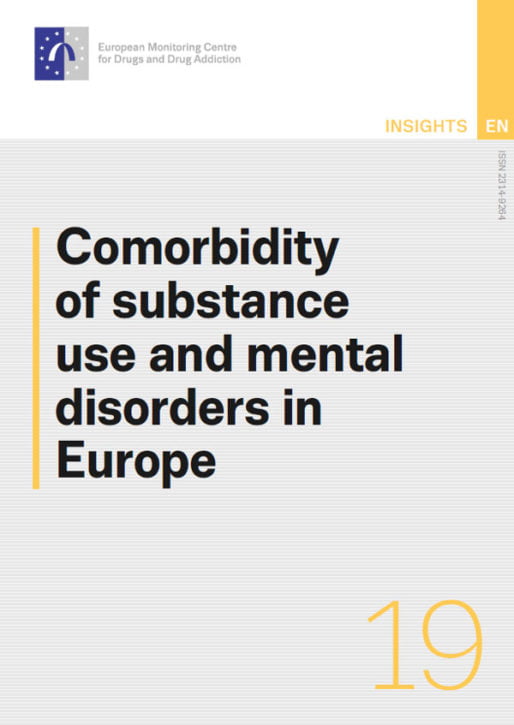Comorbidity of substance use and mental disorders in Europe
A recent (27 November 2015) report from the European Monitoring Centre for Drugs and Drug Addiction (EMCDDA) examines the intransigent issue of the co-occurrence of drug use and mental health problems.
Comorbidity of substance use and mental disorders in Europe is essentially a literature review which provides policymakers and practitioners working in the drugs field with a detailed and timely overview of the concept of this form of comorbidity (commonly known in the UK as dual diagnosis and, more recently, complex needs).
It also seeks to describe the tools available for its assessment and diagnosis.
The links between substance misuse and mental health
The link between substance use and mental health problems is a complex one and interaction between the two can play out on many levels. In some cases, the psychiatric disorder may be a risk factor for substance use, while in others it is the substance use that triggers the mental health disorder.
My experience is that many people with particular mental health disorders — particularly bipolar disorder (manic depression) — instinctively self-medicate with alcohol or drugs, providing short-term relief but a much bigger problem in the medium-long term.
Co-existence of the two raises a number of challenges such as chronicity, poor treatment outcomes, increased morbidity and, in some cases, more criminality.
The most usual form of comorbidity is the combination of a substance use disorder with depression; while anxiety is also frequent. The use of specific substances may also be associated with a specific mental health condition (e.g. cannabis use with psychosis; opioid use with a range of conditions such as antisocial/borderline personality disorders and eating disorders).
In recent years, there has been increasing interest in the comorbidity of attention deficit and hyperactivity disorder (ADHD) and substance use. In a recent study in six European countries, prevalence of ADHD substance users seeking treatment is found to range from 5% to 33%.
[divider]
Prevalence
Although European studies of comorbid alcohol/drug & mental health problems in the general population are rare, there have been 40 studies of the issue for people already in drug treatment. Methodologies vary substantially, so it wasn’t possible to come to a conclusion. However, the magnitude of the problem can be gleaned from a number of studies:
- An Austrian study found that 60% of those receiving opioid substitution therapy reported suffering from depression at some point in their lives.
- 73% of Italian heroin users were assessed as having an obsessive compulsive disorder and 67% a depressive illness.
- 39% Dutch heroin users receiving methadone were assessed as having a psychotic disorder and 34% as suffering from major depression.
- A UK study assessed 71% of men in drug treatment as having some form of mental disorder.
[divider]
Using validated screening and diagnosis tools
The report usefully sets out a range of instruments to assess psychiatric comorbidity in those with substance use disorders and presents a selection of tools used for screening and diagnosis, which vary according to the context, assessment objectives, time available and expertise of the staff.
[divider]
The challenges of treating comorbid disorders
Treating individuals suffering from comorbid disorders is challenging due to the complex nature of the condition. Although the issue of providing effective treatment in this area is considered important by drug and mental health professionals, there is a lack of consensus in Europe as to the most appropriate treatment setting and the most fitting pharmacological and psychosocial strategy to adopt.
The report describes a number of barriers to treatment including: the separation of mental health and drug use treatment settings in most European countries; insufficient use of combined expertise to treat the two disorders at the same time; and a lack of suitable treatment approaches, regulations and financial resources. Practical recommendations include the consideration and treatment of the two disorders simultaneously from a multi-professional perspective.
[divider]
A burden on health and legal systems
The report concludes that:
Taking into account the burden on health and legal systems, comorbid mental disorders among drug users result in high costs for society and lead to challenges not only for clinicians but also for policymakers.
It adds that one of the key challenges in the coming years will centre on:
Where, how and for how long to treat these patients.
The report ends with a series of recommendations including: the systematic detection and treatment of comorbid mental health disorders in those with substance use disorders; the development of future studies to improve the evidence base for care and treatment; a review of possible early interventions to identify high-risk cases; and the inclusion of comorbidity items in current reporting systems across Europe.
My experience in the UK is that despite repeated initiatives, the quality of co-ordinated treatment for those with alcohol and/or drug problems and mental health disorders varies markedly from area to area.
I still regularly work in areas where the first response from mental health services who are referred an individual with comorbid substance misuse is to reject the referral and tell the person to come back when they have found treatment for their alcohol and/or drug problem.
Depressingly, it appears that this remains the situation in much of Europe.









2 Responses
Thanks Russell. Interesting that ADHD is mentioned, but not intellectual (learning) disabilities or other neurodevelopmental disorders. Yet co-existence of such conditions can make it even harder for people to gain access to the right programmes. As noted, individuals can be batted back and forth between services and there is a great shortage of adapted programmes
Thanks for sharing your expertise Alison. It is dispiriting that practice seems to have stalled and even got backwards in some areas recently.